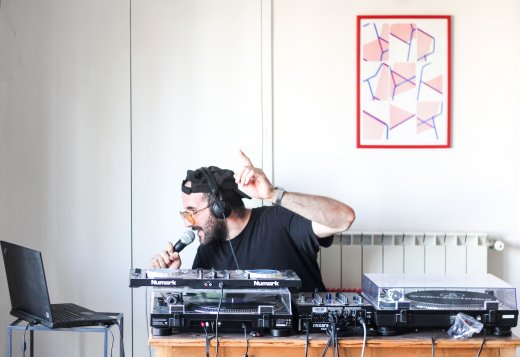
I saw Merzbow and Balázs Pándi live in Wien 2010 and I must say that the experience was immersive. For any serious music lover, Masami Akita (known as Merzbow) needs no introduction. The Japanese noise/avant-garde musician, born in 1956, studied literature and visual arts in college, where he discovered psychedelic rock, free jazz and the aesthetics of Dada. His moniker, Merzbow, is inspired by Kurt Schwitters, a pioneer of the Dada movement, famous for introducing collage methods as art, at the beginning of last century.Merzbow’s discography is very hard to follow even by collectors, as the artist has released hundreds of albums on tape, CD and vinyl. One of the most sought-after work of his is Merzbox, a massive 50-CDs box set, released in 2000.
I have been home recording for a long time. I like to play, record and mix all by myself. I don't enjoy recording in studios very much. Although there are people who tell me that they like my older recordings, they were made in a very low-tech environment and, even nowadays, I do use a computer but there is not much of a difference. I am simply happy if I can record. Furthermore, I'm not particularly into any specific recording equipment.
The equipment I use depends on the piece or the content I’m working on. I use various analogue effectors, oscillators, compact synthesizers, similar to those I use during my live performances. I also use EMS Synthi ‘A’, EMS VCS 3 and a computer.
It was around 1997 when I switched from analogue to digital and at the time no one was using a laptop computer so it was a very new attempt. Back then I mostly used Arboretum’s Ionizer in my live performances. In recent years I also have been using various granular synthesizers. However, since 2009 I have gone back to using analogue equipment, and as of now, I mostly perform using just the analogue hardware. One of the reasons being that I enjoy testing out the new Noise Compact Effector. However, I also keep using my old equipment such as DOD’s Buzz Box and Meat Box, Next’s Sampler II, Electro Harmonix’s Frequency Analyzer. Also, Roland’s Double Beat AD-50 and a vintage Wah Fuzz are indispensable in my sound making during live performances. Recent favorites include Revolver from Hexe, Super Flutter from S3N and Granular Micro Samples such as Micro Granny from Bastil Instruments.
Right now I record using a CD recorder, upload the materials on my computer and then I edit them. I used to record on DAT or cassettes, however, since it takes twice as much time to upload them on the computer, I quit using tape. When I remaster or remix my older recordings, I go back to their original media.
I usually record all of my improvisations, so I constantly have them in stock. Depending on the concept, I select my works from the newer recordings.
Most recently I created a piece called “Strange City” using samples from SunRa’s albums: “Strange Strings” and “Magic City”. In an older work called “Batztutai”, I sampled a lot of sounds from various records of musique conncrète. However, I haven’t done it in a while, due to the digital era (or information age) and the strictness in copyright (of samplings) it has brought.

At first, I started releasing self-produced cassettes wanting to share my recordings with the others. Fortunately, now I release so many records because I have commissions and release requests.
A new work that hasn’t been released yet is a Split Double CD with Poland’s Opening Orchestra called “Merzopo” which contains pieces recorded in the autumn of 2016. Other plans for 2018 include reissuing some older works and releases of reworked archive pieces. The latter is going to be released by Slowdown Records, a Japanese record label and it will include 12 CDs with works dating from 1979 till 1985. Collaboration-wise, I have recently worked with Arcane Device and HEXA and those records will be released one of these days. There is also going to be a new Cut album, in collaboration with Balázs Pándi, Mats Gustafsson and Thurston Moore.
As a vegan, I try not to unconsciously harm any living being.
*This interview was possible with the kind help of Megumi Okuda and Federico from Swamp Booking.





